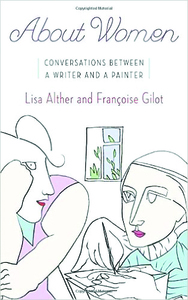

Two women conduct a cross-generational, cross-cultural dialogue about their influences.
I am admitting to a personal failing that I believe is common to most: Eavesdropping is irresistible. With only a few details snatched from an overheard conversation, a vivid imagination can concoct a most intricate story with the conversationalists as the main characters. Trains, buses, planes, doctors' offices and gyms are all productive venues for this practice. Having created a context, I give you "About Women: Conversations Between a Writer and a Painter."
In this memoir, Kingsport's own Lisa Alther (a baby-boomer, the author of "Kinficks" and other fine novels) and Françoise Gilot (a product of World War I, a painter and author of "Life with Picasso") conduct a cross-generational, cross-cultural dialogue about their influences, formative experiences, feminism and myriad other topics.
Alther, a writer exemplifying the oral tradition of the South in some of her works, and Gilot, a painter with deep roots in France's aesthetic sensibility, engage in a dialogue through the framework of comparison and contrast. They discuss their ancestral and immediate families, the time and place of their coming of age, and topics of concern for most women – loves, children and societal expectations.
The formative years of each woman provide a most fascinating hodge-podge of information. Gilot recalls her uncle's death at the very conclusion of WWI, a death that loomed large in her grandmother's and mother's lives, thus in her own life. Alther's earliest memories are of her father's absence due to WWII and his subsequent homecoming which prompted great change in her life. From Gilot's memories of learning to sew in the room that had been her deceased uncle's bedroom to Alther's recollection of re-enactments of WWII battles and Cherokee skirmishes, each draws intriguing conclusions about the psychological and artistic benefits reaped from their play. Gilot's relationship with Pablo Picasso and Alther's rejection of her marriage and traditional relationships provide adult experiences that warrant thorough exploration.
The cultural tidbits that surface provide more rich food for thought. For a taste of that, here's Gilot's observation on the difference between American and French cultural values:
"Here [America] people work during the day in order to be efficient. I admire Anglo-Saxon society because it's very utilitarian and pragmatic, and most of the time I don't want to be encumbered with all those graces. But if you ask me where the graces are, they are in the other attitude. But to have the other attitude, you must be ready to waste a lot of time."
Similarities in the cultures are noted as well. Alther notes:
"One thing that surprised me in Paris is how well everybody tells stories. In that sense, it reminds me a lot of the American South. I hadn't known that was an important part of French culture. Sitting around a dinner table, people compete with each other to tell the best stories."
As a contemporary of Alther's, I could identify with many of her conclusions about growing up during the Cold War/Vietnam War era when conflicting societal messages pitted debutante balls against women's liberation ideology. In contrast, Gilot believes that French women have long resolved the bipolar soul-searching that American women continue to undergo regarding what it means to be feminine. As friends do when conversing, Alther gently creates opportunities for Gilot to elaborate on her frequent sweeping generalizations. Asking Gilot the right questions and probing for more detail in her responses are what a reader would expect from an author of Alther's stature.
This gem of a book is perfect for those of us who relish overhearing interesting conversations. Alther's and Gilot's ruminations will be enlightening and, best of all, deliciously entertaining.
Oster is a graduate of East Tennessee State University who taught high school English in Sullivan County. She recently retired from the School of Education at King University. She is a member of the A! Magazine for the Arts' committee.